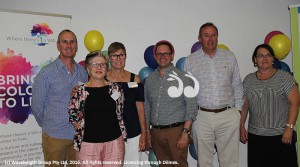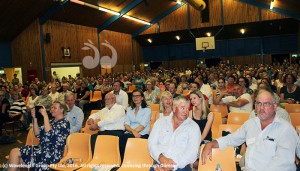Community Rallies to Protect Children
MORE than 500 people packed the hall of Scone High School last night to hear from some of Australia’s leading experts on how the Upper Hunter community can prevent their children from becoming part of the alarming statistics of suicide.
Professor Toni Noble said in the last two years suicide rates have increased by 20 percent, teenage suicides are at the highest levels in 19 years, 16 percent show no signs of depression and 60 to 80 percent of suicides are first attempts.

Warren Simons, Toni Noble, Pauline Carrigan, Matthew White, Simon Murray and Lindy Hunt who presented to the positive education initiative to the Upper Hunter community last night.
The team of experts from throughout Australia will work with the Where There’s A Will Foundation in the Upper Hunter to trial positive education in a regional community; a science based approach to educating young people to prevent the instance of suicide and improve overall mental health.
The schools of the Upper Hunter have overwhelmingly supported the new initiative and last night hundreds of local people also answered the call to action to implement the innovative education in the home, on the sporting fields and throughout the broader community.
Professor Noble said the show of community support last night was inspiring.
“This is an extraordinarily encouraging project, it is the first time this is being applied in a regional community and based on what happens here we can look at applying this throughout the state and throughout the country; this really is a lighthouse community,” said Professor Noble.
“I wasn’t sure how many would turn up, but it is very exciting that we have had a hall full of people,” she said.
Pauline Carrigan, who lost her son Will to suicide last year and established the Where There’s A Will Foundation said she is inspired to help all children in the Upper Hunter be happier.
“Hopefully they got the message that it’s important to come together as a community to achieve this, the schools need them, the kids need them and we have to stand with one voice now,” said Mrs Carrigan.
“I was really pleased to see so many people turn up after I got all of these experts here, it was a bit nerve wrecking,” she laughed.
From the audience, resident Ollie Hall asked a question about why some people are able to bounce back better than others to which the experts explained it is partly biological that some people are naturally more resilient, but is also about learned coping behaviours, which is what they want to teach children.
They cautioned that every person has their breaking point and a ‘toughen up’ approach had done little to prevent mental illness and suicide and in fact may have done more harm.
Pauline Carrigan said her advice to her own son was to tell him things would be fine and she now understands Will did not have the tools to understand how at risk he was and seek help and as a mother she did not know how to recognise the signs and help him.
But in less than 12 months following the death of her son, Pauline has started a grass roots movement educate a whole community in what experts have described as a lighthouse for the rest of Australia, so how is Pauline so resilient?
“I think some people have a natural resilience I know I have a natural resilience, I’ve always been able to bounce back and look for a positive in life and my positive I take with me every day is ‘wow how lucky I was to have Will for 24 years’, not that he is gone now,” she said.
“Will is my inspiration, because he didn’t have the ability it makes me want to get up and make sure my grandkids have the ability, he inspires me from above,” Pauline Carrigan said.
Next steps in the project will be implementing positive education in each Upper Hunter school, with experts working with each school to tailor a program.
The Where There’s A Will Foundation will seek to raise money and train an additional 60 community members in positive education next year.
The following question was asked of the panel last night: When you go home tonight, what is something practical you can you do with your children?:
Pauline Carrigan: Ask how their day was, but truly listen to the answer.
Warren Simons: Get them to write down three good things that happened to them today, write why it happened and what you can do to have this happen more often and do it every night. Research shows within two weeks they will have a higher level of wellbeing.
Toni Noble: Looking for the good things in a bad situation, model that so your children see you do that everyday.
Matthew White: I encourage you all to log onto a website: www.authentichappiness.org and do the character strengths survey with your family.
Simon Murray: I’ll go home, hug them and tell them I love them.
Related stories:
If you are struggling with mental health issues, there’s always someone you can chat with on the phone or online at:
 scone.com.au
scone.com.au